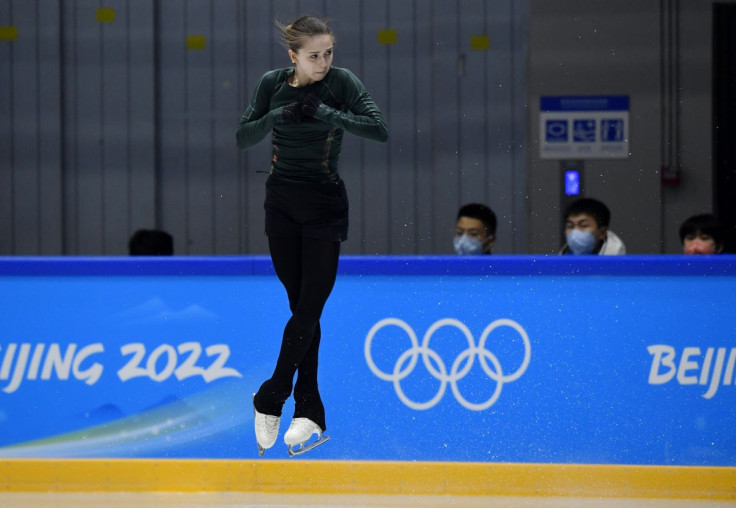Olympics-Valieva Tested Positive For Angina Drug, Russians Say Protecting 'Honest' Gold

Teen figure skating sensation Kamila Valieva won a gold medal having earlier failed a drug test and Olympic officials will fight Russia's decision to let her compete at the Winter Games, the International Testing Agency (ITA) said on Friday.
The 15-year-old's gold medal and Games future now hangs in the balance as the International Olympic Committee (IOC) attempts to draw a line in the sand over Russian doping.
Russian athletes are competing at the Beijing Games without their flag and national anthem because of sanctions against Russia for previous violations. Russia has acknowledged some shortcomings in its implementation of anti-doping rules, but denies running a state-sponsored doping programme.
Valieva delivered one of the highlights of the Beijing Games so far when she landed the first quadruple jumps by a woman in Olympic competition on Monday.
Her Olympic dream, however, turned into a nightmare on Friday when the ITA revealed publicly that she had tested positive for banned angina drug Trimetazidine in a urine sample collected by Russian authorities at the national championships in St Petersburg on Dec 25.
"It is a shame, and the responsible adults should be banned from the sport forever!!!" German figure-skating great Katarina Witt posted on Facebook. "What they knowingly did to her, if true, cannot be surpassed in inhumanity and makes my athlete's heart cry infinitely."
The testing lab in Stockholm, Sweden reported on Tuesday that her sample was positive, the day after she wowed the world with her unique quadruple jumps and helped win the gold for her team, who are competing as the Russian Olympic Committee (ROC).
It was not immediately clear why there was such a delay between her test and the result, which allowed her to travel to Beijing and take part in the first of her two events.
The IOC said the handling of this case was initially with the Russian testing authorities and then with the World Anti-Doping Agency (WADA) accredited lab.
WADA declined to comment on Friday. The Russian Anti-Doping Agency (RUSADA) did not immediately respond to Reuters inquiries.
COMPREHENSIVE MEASURES
The Russian Olympic Committee said it was taking comprehensive measures to protect its athletes and to keep a gold medal won 'honestly'.
It said that Valieva's tests were negative before and after Dec. 25.
RUSADA imposed a provisional suspension on Valieva after Tuesday's test result. She appealed a day later and her ban was lifted. The Russians did not disclose publicly the reason for removing the ban.
Now, the IOC and the International Skating Union (ISU) have said they would ask the Court of Arbitration for Sport (CAS) to overturn the Russian decision to lift her ban. CAS on Friday said it had not yet received the appeal.
"We have a 100 percent policy against doping," IOC spokesman Mark Adams said in a press conference on Friday.
He added the IOC had demanded that a decision be made before Valieva is due to compete again on Tuesday in the women's singles. Under the rules of the draw, the ROC cannot replace Valieva in singles competition because she has already competed in the team event.
Valieva, wearing a navy hoodie and black tights under padded shorts, skated in practice on Friday afternoon with her team mates Anna Scherbakova and Alexandra Trusova, as well as Russian-born Anastasia Gubanova, who represents Georgia.
For days, a doping cloud has hung over Russian teenager Valieva and the Olympics. The medal ceremony for the team event has been delayed for days, with Team USA and Japan waiting in the wings for their prizes.
Russian media first reported that Valieva had tested positive on Wednesday.
"We need to expedite this as quickly as possible for all those concerned," the IOC's Adams said earlier.
© Copyright Thomson Reuters 2024. All rights reserved.







